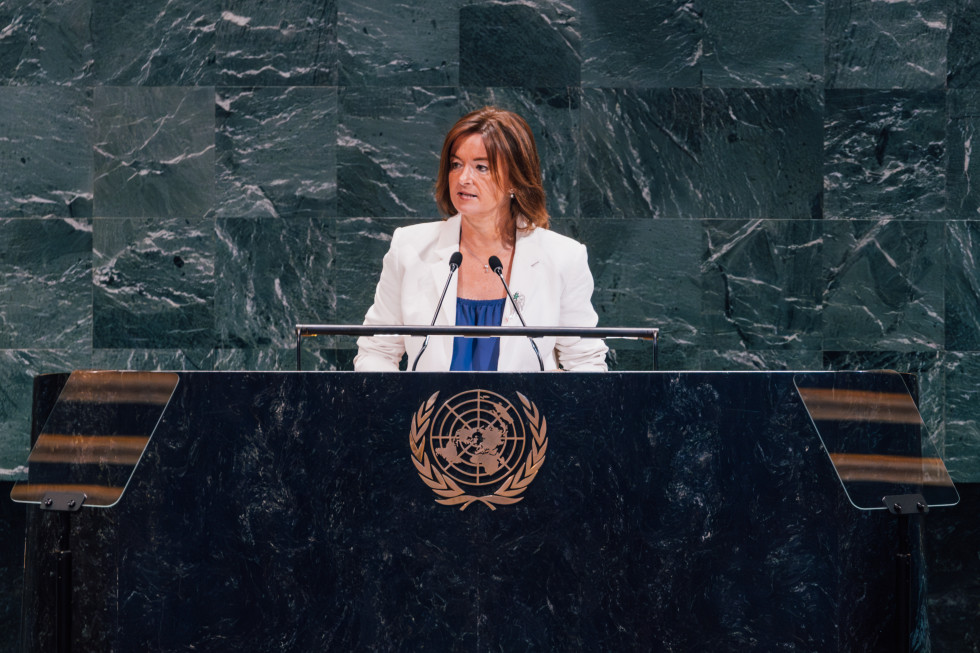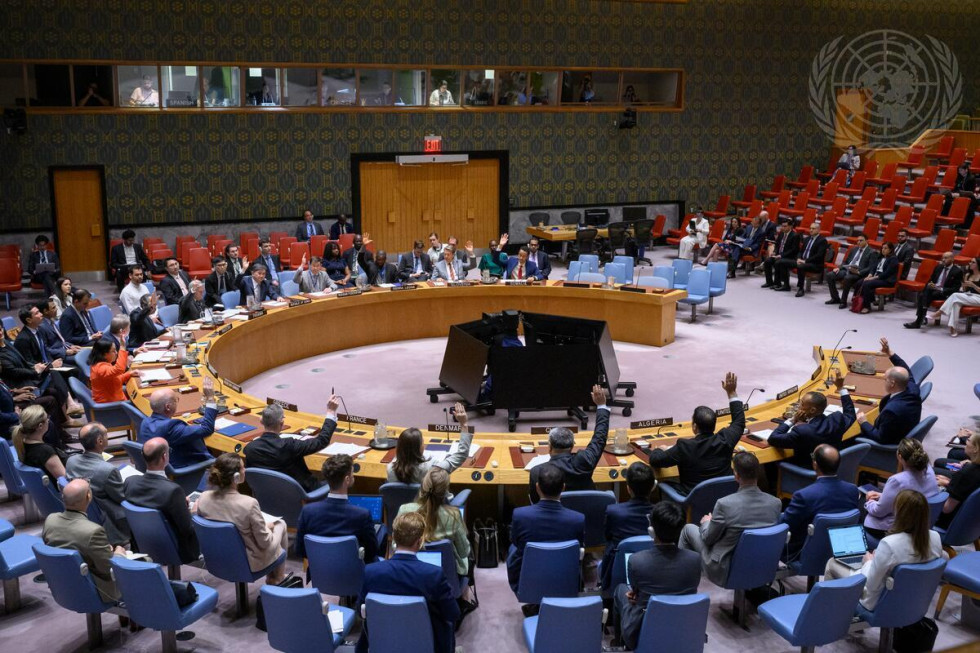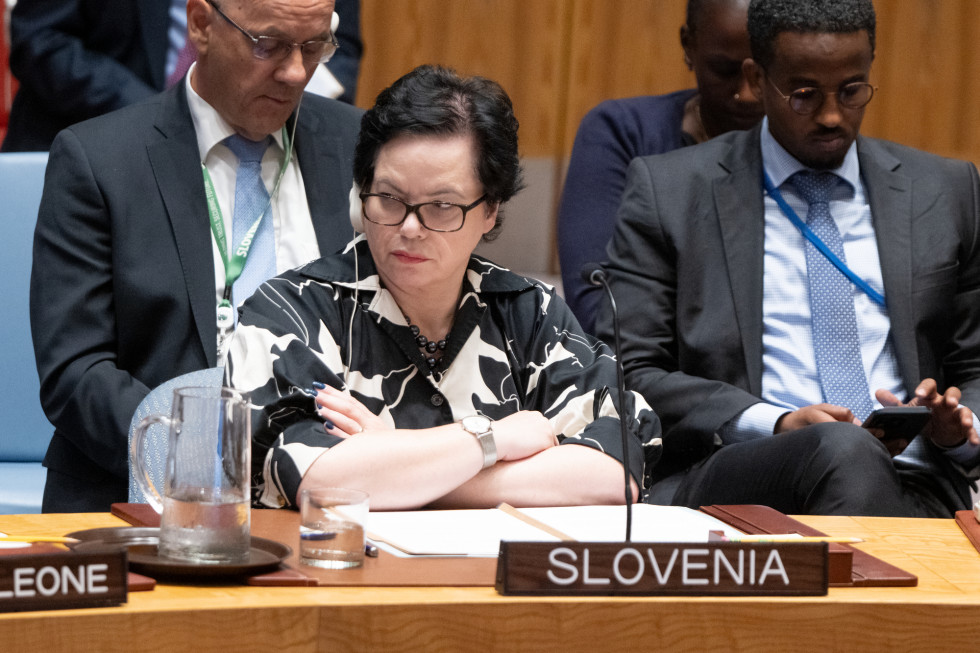Highlights of Slovenia’s activities in the UN Security Council in July 2025
During its presidency, Pakistan organised two signature events: a high-level open debate on promoting peace and security though multilateralism and the peaceful settlement of disputes, and on cooperation between the UN and the regional and subregional organisations, spotlighting UN's engagement with the Organisation of Islamic Cooperation (OIC). In addition, the Council held its regular quarterly open debate on the situation in the Middle East.
New York hosted the conference in support of the two-state solution for Israel and Palestine, launched in June, which was attended by Minister Tanja Fajon.
Slovenia continued to pursue its priority areas of action within the Council. Alongside the other European members of the Council, Slovenia requested a briefing on the humanitarian situation in Gaza to support the protection of civilians. This was delivered by Under-Secretary-General for Humanitarian Affairs Tom Fletcher. The discussion highlighted the need for humanitarian aid and addressed issues such as the threat of famine, attacks on displaced persons, schools and camps, forced displacement, the upcoming conference on the two-state solution and the situation in the West Bank.
The Council's open debate on the situation in the Middle East focused on the humanitarian situation in Gaza, emphasising starvation and the challenges involved in distributing humanitarian aid. In their statements, States drew attention to the situation in the West Bank and settler violence, as well as to the conference on the two-state solution. They also touched on developments in Lebanon, Syria and Iran.
To gain a better understanding of the political and security challenges in Europe, Slovenia, together with Denmark, hosted a meeting of the elected members of the Council with the EU Special Representative for the Belgrade-Pristina Dialogue. Slovenia also organised a meeting of the elected members with the new Permanent Representative of Ukraine in New York.
Together with other European countries and the Republic of Korea, Slovenia requested a debate on the deteriorating security and humanitarian situation in Ukraine. The debate focused on the escalation of Russian airstrikes and diplomatic efforts to resolve the conflict, including talks between the two sides in Istanbul. Several members, including Slovenia, called for an immediate and unconditional ceasefire.
In mid-July, the Security Council held an emergency briefing on the situation in Syria. Most Council members condemned all violence against civilians and attacks by the Israeli air force, stating that such actions "jeopardise efforts to establish a new Syria that could contribute to peace both at home and in the region."
Regular consultations were held on the implementation of Security Council resolution 1701 on Lebanon, in which Member States welcomed the further strengthening of Lebanese state institutions, the implementation of reforms and the judiciary, and progress in the deployment of the Lebanese Armed Forces to positions south of the Litani River. Most members pointed out that the continued presence of UNIFIL remains crucial for maintaining stability.
The Council held regular debates on the situation in Yemen, focusing particularly on the ongoing Houthi attacks on ships in the Red Sea, which have resulted in civilian casualties, as well as on the situation in Haiti and Colombia.
At the beginning of the month, the Council's attention focused on the situation in Haiti. Council members have yet to agree on how to respond to the UN Secretary-General's recommendations regarding the continued presence of the UN on the island.
In mid-July, the Special Representative of the UN Secretary-General in Cyprus and Head of the UN Peacekeeping Force (UNFICYP) delivered his final report to the Council before the end of his mandate, stressing the need to overcome the deep mistrust and to promote intercommunal dialogue, economic integration and inclusion.
The Council adopted six resolutions: on extending the respective mandates of the UN Integrated Office in Haiti (BINUH) and the UN Mission to Support the Hodeidah Agreement in Yemen (UNMHA) for six months; on extending the reporting requirement on the situation in the Red Sea for six months; on extending the targeted sanctions measures and the mandate of the Panel of Experts on Armed Groups in the Central African Republic for one year; and a thematic resolution on strengthening mechanisms for the peaceful settlement of disputes. The Council adopted a resolution setting 12 November this year as the date for the election of a new member of the International Court of Justice, following the resignation of Judge Yusuf.
The Council adopted a presidential statement on UN-OIC cooperation. In response to developments in the Democratic Republic of the Congo (DRC), it issued two press statements welcoming the signing of a peace agreement between the DRC and Rwanda, which was facilitated by the United States, Qatar and the African Union, as well as the agreement between the DRC and the AFC/M23 rebels.




